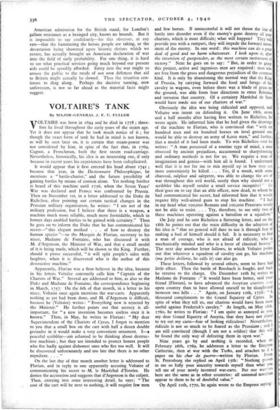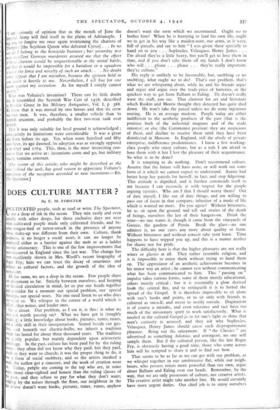VOLTAIRE'S TANK
By MAJOR-GENERAL J. F. G. FULLER
VOLTAIRE was born in 1694 and he died in 1778 ; there- fore he lived throughout the early years of the steam age. Yet it does not appear that he took much notice of it ; for though the exact form of tank he had in mind is not known, as will be seen later on, it is certain that steam-power was not considered by him, in spite of the fact that, in 1769, Cugnot, a Frenchman, built the first steam road-carriage. Nevertheless, historically, his idea is an interesting one, if only because in recent years his experiences have been reduplicated.
It would appear that it first entered his head about 1741 ; because that year, in the Dictionnaire Philosophique, he mentions a " battle-chariot," and the future possibility of gaining battles by means of cannon alone. Yet nothing further is heard of this machine until 1756, when the Seven Years' War was declared and France was confronted by Prussia. Then on November 1st, in a letter addressed to the Duke de Richelieu, after pointing out certain tactical changes in the Prussian military organisation, he writes: " I am not of the military profession, but I believe that there is a weapon, a machine much more reliable, much more formidable, which in former days enabled battles to be gained with certainty." Then he goes on to inform the Duke that he has communicated his secret—" this elegant method . . . of how to destroy the human species "—to the Marquis de Florian, secretary to his niece, Madame de Fontaine, who has discussed it with M. d'Argenson, the Minister of War, and that a small model of it is being made, which will be shown to the King. Further, should it prove successful, " it will split people's sides with laughter, when it is discovered who is the author of this destructive machine."
Apparently, Florian was a firm believer in the idea, because in his letters Voltaire constantly calls him " Captain of the Chariots of War." Several are addressed to him, as also to the Duke and Madame de Fontaine, the correspondence beginning in March, 1757. On the 6th of that month, in a letter to his niece, Voltaire once again mentions the war-carts. Apparently nothing as yet had been done, and M. d'Argenson is difficult, because he (Voltaire) writes: " Everything new is rejected by the Minister." He further points out that secrecy is all- important, for " a new invention becomes useless once it is known." Then, in May, he writes to Florian: "My dear Superintendent of the Chariots of Cyrus, I forgot to mention to you that a small box on the cart with half a dozen double grenades in it would make a very convenient ornament. I—a peaceful scribbler—atii ashamed to be thinking about destruc- tive machines ; but they are intended to protect honest people who fire badly against dishonest ones who fire too well. It will be discovered unfortunately and too late that there is no other expedient. . . . "
On the last day of that month another letter is addressed to Florian, and in reply to one apparently accusing Voltaire of communicating his secret to M. le Marechal d'Estrees. He denies the accusation and suggests that d'Argenson is the culprit. Then, entering into some interesting detail, he says: "The cost of the cart will be next to nothing, it will require few men and few horses. If unsuccessful it will not throw the line of battle into disorder even if the enemy's guns destroy all your chariots, which is most difficult; what will happen? They will provide you with a rampart, they will impede the forward move_ ment of the enemy. In one word: this machine can do a great deal of good and no harm whatsoever. I look upon it, after the invention of gunpowder, as the most certain instrument of victory." Next he goes on to say: " But, in order to grasp this project, active and ingenious men are required: men who are free from the gross and dangerous prejudices of the common kind. It is only by abandoning the normal way that the King of Prussia, by carrying forward the food and forage of his cavalry in wagons, even before there was a blade of grass on the ground, was able from four directions to enter Bohemia and terrorise that country. Of a certainty Marechal de Saxe would have made use of our chariots of war."
Obviously the idea was being ridiculed and opposed, and Voltaire was intent on defending it. On June ath, seven and a half months after .having first written to Richelieu, he wrote again. He informed him that he had given the drawings of the machine to Florian, who is convinced that " with six hundred men and six hundred horses on level ground one would be able to destroy an army of 6,000 men," and further, that a model of it had been made. To win Richelieu over he writes: " A man possessed of a routine type of mind, a man obsessed by ancient prejudices, accustomed to sharpshooting and ordinary methods is not for us. We require a man of imagination and genius—with him all is found. I understand well that it is not for me to mix myself up in how men can most conveniently be killed. . . . Yet, if a monk, with some charcoal, sulphur and saltpetre, was able to change the art of war throughout this evil world, surely then why should not a scribbler like myself render a small service incognito? " lie then-goes on to say that an able officer, now dead, to whom he had communicated his secret, had informed him that it would require fifty well-aimed guns to stop his machine " I had in my head what 1oo,000 Romans and x oo,000 Prussians would not be able to resist. . . . Try, therefore, to see only two of these machines operating against a battalion or a squadron."
On July 2nd he sent Richelieu a flattering letter, and on the 18th he points out that the main difficulty in the adoption of his idea is " that no general will dare to use it through fear of making a fool of himself should it fail. It is necessary to find a man of courage, who is not afraid of ridicule, who is mechanically minded and who is a lover of classical history." The next day another letter follows, in which Voltaire points out that wherever a squadron of cavalry can go, his machine (ma petite drolerie, he calls it) can also go.
These letters, followed by several others, seem to have had little effect. Then the battle of Rossbach is fought, and back he returns to the charge. On December toth he writes to Madame de Fontaine :" It would have been better, said your friend [Florian], to have advanced the Assyrian cnariots open country than to have allowed oneself to be slaughtered between two hills . . ." Again, on January loth, 1758: " A thousand compliments to the Grand Equerry of Cyrus. In spite of what they tell us, our chariots would have been most useful against Frederick's cavalry." At length, on May 26th. 176o, he writes to Florian: " I am quite as annoyed as you, my dear Grand Equerry of Assyria, that they have not dared to try out my carts—fear of looking ridiculous! Nevertheless, ridicule is not so much to be feared as the Prussians ; and I am still convinced (though I am not a soldier) that this will be found the only way of defeating them in open war."
Nine years go by and nothing is recorded, when on February 26th, 1769, he addresses a letter to the Empress Catherine, then at war with the Turks, and attaches to it a paper on his char de guerre—written by Florian. Front St. Petersburg she replied on April 75th: Nothing roves to me so fully your sincerity towards myself than what ru tell me of your newly invented war-carts. But our war-:ors here are the same as in other countries: all untested novelties appear to them to be of doubtful value."
On April loth, i77o, he again wrote to the Empress saying: I am seriously of opinion that m the month -of June the perial Army will find itself in the plains of Adrianople. I you to forgive me once again mentioning the chariots of alwris [the Scythian Queen who defeated Cyrus] . . In no do I belong to the homicide business ; but yesterday two t excellent German murderers assured me that the effect of diese chariots would be unquestionable in the initial battle, oid that it would be impossible for a battalion or a squadron res:st the force and novelty of such an attack. . . No doubt Inlay c: spear that I am mistaken, because the apinion held in tour court is hostile to me. Nevertheless, I ask but for one reason against my invention. As for myself I simply cannot see O,_„ went was Voltaire's invention? There can be little doubt that it resembled the Scottish War Cart of 1456, described by Fr2acis Grose in his Military Antiquities, Vol. I, p 388. We know that it was moved by two horses and that its crew us two men. It was, therefore, a smaller vehicle than its Scottish ancestor, and probably the first two-man tank ever devised.
That it was only suitable for level ground is acknowledged ; wase:itiently its limitations were considerable It was a great idea born before its age. Yet, when some hundred and fifty years later, its age dawned, its adoption was as strongly opposed as in 1757 and 1769. This, then, is the most interesting con- dusin-i that we arrive at: inventions come and go, but military Tacity remains constant.
[The writer of this article, who might be described as the mind !-Thind the tank, has good reason to appreciate Voltaire's expeilence of the reception accorded to new inventions.—En. The Spectator.]



























 Previous page
Previous page